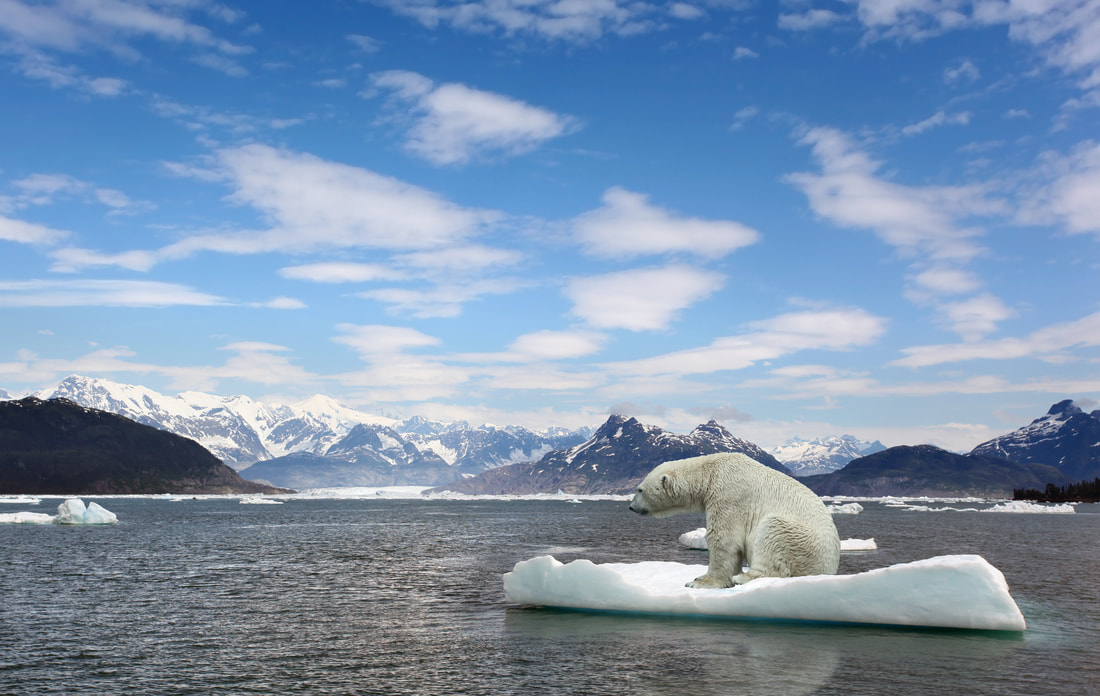|
Polar bears are apex predators in the Arctic, and are often one of the first animals we recognize from this region. They are a dominating symbol in our culture of the strength and endurance of the Arctic, traveling great distances to catch prey – primarily ringed and bearded seals. Polar bears reside in 19 subpopulations across the Arctic, including Alaska, Canada, Greenland, Russia and Norway. The World Conservation Union (IUCN) estimates that there are between 20,000-25,000 polar bears in the world. However, these powerful and majestic animals are facing increased threats due to human activities.
Sea ice loss is lengthening the summer fasting period for polar bears throughout the arctic according to multiple studies. In fact, sea ice is melting at a rate of 28 percent a year – faster than ever before (Atwood et al., 2016). This loss of habitat results in an increased risk for muscle atrophy and impaired performance in hunting and traveling. There is a reduction in these abilities because atrophied muscles fatigue easier, produce less maximum force, and impair balance and coordination. Muscle atrophy is further exacerbated by the decreased abundance of prey. Furthermore, polar bears are no longer able to hunt in their preferred ice shelf habitats, leading them to become “trapped.” There is uncertainty as to whether polar bears – who have adapted to an existence on the sea ice – can change to better survive in these new conditions. Ultimately, because polar bears travel extensive distances for foraging and match force exertion to prey body size for maximum hunting efficiency, muscle atrophy due to sea ice loss could be a contributing factor in the decline of polar bear survival (Whiteman et al., 2017). Losing more polar bears is cause for concern. Polar bears are at the top of the food web, meaning that they can signal problems in the Arctic marine ecosystem. Additionally, apex predators play a fundamental role in ecosystem functioning, disease regulation, and biodiversity maintenance (Stier et al., 2016). The wide array of research on polar bears and sea ice loss highlights the growing concern within the scientific community regarding induced climate change, polar sea ice integrity, and the ability for species to survive in a changing climate. So what can we all do about it? Due to the decline in sea ice and the expansion of human activities, proactive management of human-polar bear interactions will be needed to reduce conflicts and risks for both parties. These conflicts can adversely affect wildlife populations in the area, causing economic losses, and endangering both human and polar bear safety. Atwood et al. suggest that monitoring the timing and rate of seasonal ice loss may be an effective, reasonable way for managers to prepare for these interactions and assure long term polar bear survival in these changing conditions. In the end, the challenges facing polar bears are the same that impact us. We can already see the impacts of drought on food production in Africa, the Middle East, and other highly populated areas around the world. We all can make a difference by spreading awareness about these issues and by reducing our carbon footprints. If we really want to save polar bears and play a part in reducing carbon emissions. This is as easy as turning the lights off or walking/biking instead of driving daily. Political leaders need to initiate the transition to sustainable energy sources to reduce emissions on a large scale. You can help this by contacting your representatives and by voting for officials who care about these issues. If we all do our part, and if we see political action on these issues, we can make a difference. References: Atwood TC, Peacock E, McKinney MA, Lillie K, Wilson R, Douglas DC, Miller S, Terletzky P. (2016). Rapid environmental change drives increased land use by an Arctic marine predator. PLOS One. 11: e0155932. Pilfold NW, Hedman D, Stirling I, Derocher AE, Lunn NJ, Richardson E. (2016) Mass loss rates of fasting polar bears. Physiol. Biocehem. Zool. 89(5): 377-388. Stier AC, Samhouri JF, Novak M, Kristin MN, Ward EJ, Holt RD, Levin PS. (2016). Ecosystem context and historical contingency in apex predator recoveries. Science Advances. 2(5): e1501769. Whiteman JP, Harlow HJ, Durner GM, Regehr EV, Rourke BC, Robles M, Amstrup SC, Ben-David, M. (2017). Polar bears experience skeletal muscle atrophy in response to food deprivation and reduced activity in winter and summer. Conserv. Physiol. 5(1): 1-15.
0 Comments
Leave a Reply. |
AUTHORZach Affolter is a passionate aspiring marine biologist and animal/environmental advocate. Categories
All
Archives
July 2023
|

 RSS Feed
RSS Feed